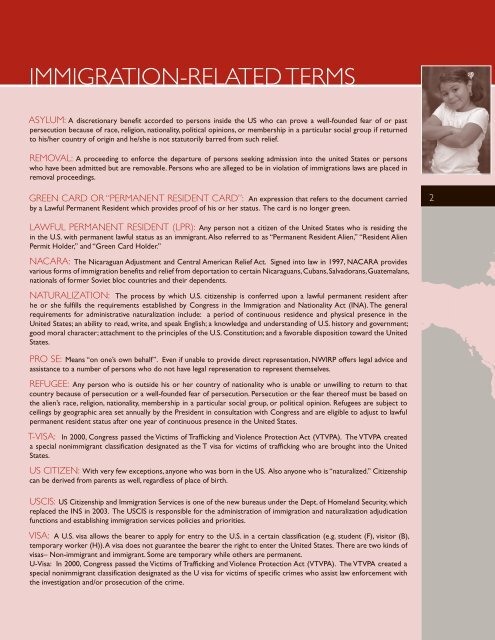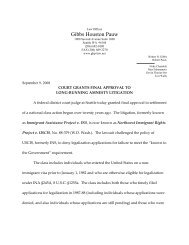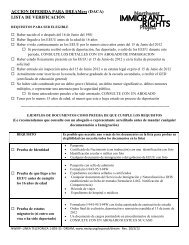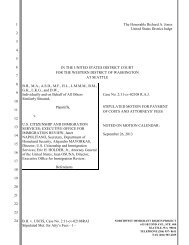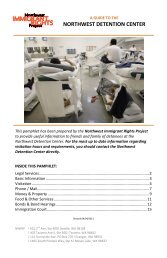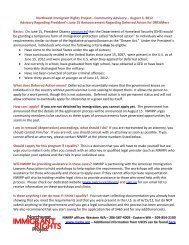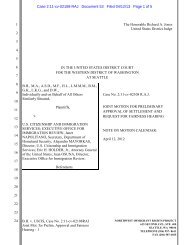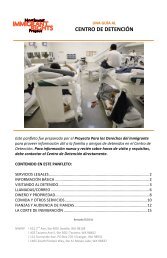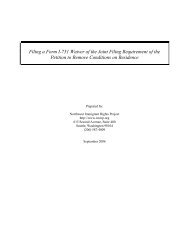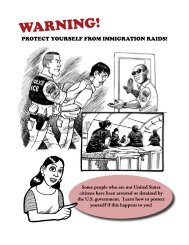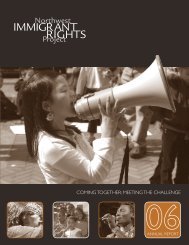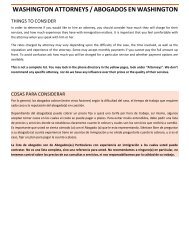nwirp annual report fy 2005 - Northwest Immigrant Rights Project
nwirp annual report fy 2005 - Northwest Immigrant Rights Project
nwirp annual report fy 2005 - Northwest Immigrant Rights Project
Create successful ePaper yourself
Turn your PDF publications into a flip-book with our unique Google optimized e-Paper software.
Immigration-Related Terms<br />
Asylum: A discretionary benefit accorded to persons inside the US who can prove a well-founded fear of or past<br />
persecution because of race, religion, nationality, political opinions, or membership in a particular social group if returned<br />
to his/her country of origin and he/she is not statutorily barred from such relief.<br />
Removal: A proceeding to enforce the departure of persons seeking admission into the united States or persons<br />
who have been admitted but are removable. Persons who are alleged to be in violation of immigrations laws are placed in<br />
removal proceedings.<br />
Green Card or “Permanent Resident Card”: An expression that refers to the document carried<br />
by a Lawful Permanent Resident which provides proof of his or her status. The card is no longer green.<br />
<br />
Lawful Permanent Resident (LPR): Any person not a citizen of the United States who is residing the<br />
in the U.S. with permanent lawful status as an immigrant. Also referred to as “Permanent Resident Alien,” “Resident Alien<br />
Permit Holder,” and “Green Card Holder.”<br />
NACARA: The Nicaraguan Adjustment and Central American Relief Act. Signed into law in 1997, NACARA provides<br />
various forms of immigration benefits and relief from deportation to certain Nicaraguans, Cubans, Salvadorans, Guatemalans,<br />
nationals of former Soviet bloc countries and their dependents.<br />
Naturalization: The process by which U.S. citizenship is conferred upon a lawful permanent resident after<br />
he or she fulfills the requirements established by Congress in the Immigration and Nationality Act (INA). The general<br />
requirements for administrative naturalization include: a period of continuous residence and physical presence in the<br />
United States; an ability to read, write, and speak English; a knowledge and understanding of U.S. history and government;<br />
good moral character; attachment to the principles of the U.S. Constitution; and a favorable disposition toward the United<br />
States.<br />
Pro se: Means “on one’s own behalf”. Even if unable to provide direct representation, NWIRP offers legal advice and<br />
assistance to a number of persons who do not have legal represenation to represent themselves.<br />
Refugee: Any person who is outside his or her country of nationality who is unable or unwilling to return to that<br />
country because of persecution or a well-founded fear of persecution. Persecution or the fear thereof must be based on<br />
the alien’s race, religion, nationality, membership in a particular social group, or political opinion. Refugees are subject to<br />
ceilings by geographic area set <strong>annual</strong>ly by the President in consultation with Congress and are eligible to adjust to lawful<br />
permanent resident status after one year of continuous presence in the United States.<br />
T-Visa: In 2000, Congress passed the Victims of Trafficking and Violence Protection Act (VTVPA). The VTVPA created<br />
a special nonimmigrant classification designated as the T visa for victims of trafficking who are brought into the United<br />
States.<br />
US Citizen: With very few exceptions, anyone who was born in the US. Also anyone who is “naturalized.” Citizenship<br />
can be derived from parents as well, regardless of place of birth.<br />
USCIS: US Citizenship and Immigration Services is one of the new bureaus under the Dept. of Homeland Security, which<br />
replaced the INS in 2003. The USCIS is responsible for the administration of immigration and naturalization adjudication<br />
functions and establishing immigration services policies and priorities.<br />
Visa: A U.S. visa allows the bearer to apply for entry to the U.S. in a certain classification (e.g. student (F), visitor (B),<br />
temporary worker (H)). A visa does not guarantee the bearer the right to enter the United States. There are two kinds of<br />
visas– Non-immigrant and immigrant. Some are temporary while others are permanent.<br />
U-Visa: In 2000, Congress passed the Victims of Trafficking and Violence Protection Act (VTVPA). The VTVPA created a<br />
special nonimmigrant classification designated as the U visa for victims of specific crimes who assist law enforcement with<br />
the investigation and/or prosecution of the crime.


